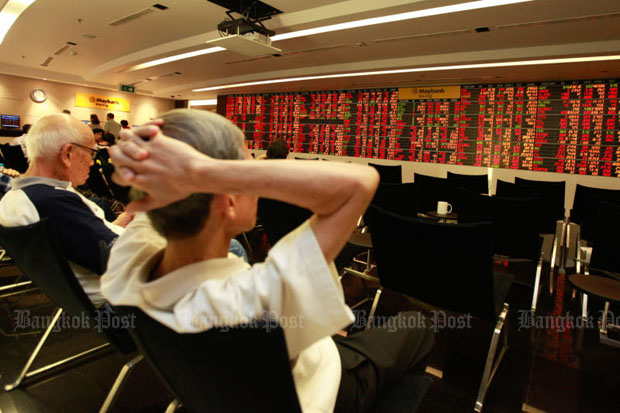
Most Asian bourses were swept away by a torrent of shockwaves on Monday as recent imposition of the tit-for-tat tariffs between the world's two largest economies had a demoralising effect on global trade and economic growth.
The Stock Exchange of Thailand (SET) index was among the casualties of sinking confidence, with the benchmark plummeting the most in Southeast Asia, on par with Singapore.
The bourse plunged by 23.95 points or -1.45% to end the day at 1,622.73 points in turnover worth 64.7 billion baht. The SET index fell by some 35 points during morning trade, with the lowest level gauged at 1,609.40 points.
Steep losses were seen across Asia-Pacific, with Japan's Nikkei 225 tumbling by 2.17% and Hong Kong's Hang Seng index dropping by 1.9%.
Funds are moving into risk-free assets as fears of the US recession and slower global economic growth are on the rise because of brewing Sino-US trade tensions, said SET president Pakorn Peetathawatchai.
"Today's drop resulted from the events of last Friday. We will have to follow what will unfold next," said Mr Pakorn.
"Equities associated with the industry, exports and hospitality have been affected by external factors, but share prices are expected to return to normal when the situation eases," he said.
The latest tariffs hike by the US was a response to Beijing's decision to raise levies between 5-10% on US$75 billion of US goods, starting on Sept 1.
Tariffs on $250 billion worth of Chinese goods will be raised to 30% from 25% on Oct 1, while those planned on $300 billion of Chinese goods, set to take effect on Sept 1, will be raised to 15% from 10%.
INVERTED YIELD CURVE
A trade war between the US and China is the most crucial factor affecting stock markets worldwide, while the Jackson Hole speech by US Federal Reserve chairman Jerome Powell did not provide any confidence on the interest rate outlook, economic risks or the inverted yield curve, said Trinity Securities executive director Nuttachart Mekmasin.
"The yield spread between the 10-year and two-year US Treasury has been negative at some points," said Mr Nuttachart.
An inverted yield curve, whereby the 10-year yield is lower than the yields of short-term debt securities, signifies investors' prediction of lower interest rates in the future because longer-term bonds are in demand, sending yields down.
An inverted yield curve is also used to forecast an economic downturn. The US Treasury yield inverted in late 2005, in 2006 and in 2007 before the US subprime mortgage crisis erupted.
The yield spread between the 10-year and two-year Thai government bonds also stood in negative territory temporarily at -0.0033% during Monday morning.
"This is a significant development for the market as it is the first time the yield spread turned negative since the major floods in 2011. This reflects market participants starting to worry more about Thailand's economic conditions amid heightening downside risks," said Mr Nuttachart.
The negative yield spread also reflects investors anticipating Thailand's stock market falling further and the Bank of Thailand could implement further monetary easing to shore up growth momentum, he said.
Ariya Tiranaprakit, senior executive vice-president at the Thai Bond Market Association, said the gap between 10-year and two-year government bonds was not negative when the market closed.
The 10-year yield stood at 1.46%, while the yield was at 1.42% for the two-year government bond.

